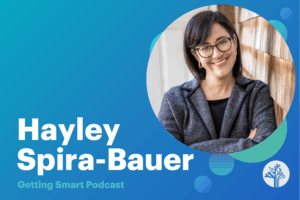Preparing Students for the Gig Economy, Automation and Uncertainty

This blog originally ran on Education Week.
Today’s students will graduate into a much different world than their parents. Many jobs will change or be replaced by technology, people will be far more inclined (whether forced to be or not) to take project-based work and the jobs that do exist will require high technical skill.
In a recent EdWeek blog, Marc Tucker explains how schools must provide experiences where students will gain access to the necessary skills, environments and mentors to prepare them for this new workforce. Students will need to be more broadly prepared, curriculum should be driven by experience not subject matter and he urges the importance of applied learning.
By Marc Tucker
Assume for the moment that you could design an education system for an entire state or nation. What would it look like? Why? What follows is not a design, but rather some considerations you might want to take into account as you put one together.
A few guiding assumptions:
- Automated and intelligent digital systems will rapidly destroy the jobs available to people with only basic literacy; adults who do not become masters of these automated and intelligent systems will be mastered by them.
- The nature of the rewarding careers and jobs that will be available to well-educated and highly trained people when today’s primary school students join the full-time workforce is increasingly uncertain. It is increasingly likely that individuals will become self-employment contingent workers, holding a changing array of multiple jobs for multiple clients at the same time—i.e., the “gig economy.”
- It is not just the nature of jobs and careers that is becoming more and more uncertain; in an increasingly interconnected world, life in general is likely to be more volatile, complex, uncertain and ambiguous.
- The willingness of employers to invest in increasing the skills and knowledge of their employed and contingent workers will decrease from its current low level because the likelihood that the employer will benefit from the investment decreases as ties between employers and workers continue to weaken.
- But the need of employers to hire people with ever greater levels of technical skill will increase as systems become more complex, relationships among them become more important, and technology-induced change produces shifts in demand for products and services.
- High literacy—the ability to relate well to many kinds of people from many different backgrounds and to communicate with them, the ability to see patterns others don’t and to use them to produce original insights that facilitate the solutions to new problems and open the way to new frontiers—will be ever more valued.
- As machines do more of the work, the ethical compasses of the people who build and control them become ever more important; tolerance, empathy and ethics will come to the fore.
- School and formal education has, up to now, been the primary method by which society has transmitted to the next generation the formal knowledge and cognitive skills students will need as adults, digital technologies can now provide access to a previously unimaginable trove of knowledge; the question now is how the school can provide access to the experiences and the guidance students will need to respond to these new conditions by acquiring the skills knowledge, attitudes and values they need. This suggests a transformation in the core functions of schooling.
The T-Shaped Curriculum
Here we have our first dilemma. All students will need to have a much deeper understanding of the subjects they study, in particular a conceptual underpinning of those subjects, as well as the ability to integrate what they are doing across subjects, to say nothing of the ability to apply what they know to a changing array of very practical and complex issues and problems.
Gaining a much deeper understanding of the core subjects in the curriculum would appear to demand much more class time. The assumptions above would also imply that students would need to spend much more time involved in carefully orchestrated in-school extracurricular activities and out-of-school activities, all of them used as opportunities to develop the skein of knowledge, skills, attitudes and values discussed above.
Where is that time going to come from? How can the school staff make sure that these activities actually produce the student growth and learning they are intended to produce? Can these issues be addressed by better management of the time already available?
But that is not all. The assumptions above predicated that the student will need not only to be more broadly educated but also that the student will have to enter the workforce with a much higher initial skill level in a particular area. All over the most developed economies, population levels are falling and people are living longer. This challenge cannot be addressed by extending the time allocated to initial education because that would make the ratio of employed people to unemployed people too small for the employed to support those being educated as well as those in retirement. Somehow, all this will have to be packed into the time now taken to educate the young.
Experience (Not Subject Matter) As The Organizer Of The Curriculum
The content of the core subjects in the curriculum is essential. But it is, taken together, only a small part of what the student described above has to learn. Where is the student to learn perseverance? Concentration? Focus? How to be humble when successful and resilient in the face of failure? How to lead others and be a good contributor as a team member? Value people who are different? Gain courage and self-reliance? See the value in providing service to others? Tell the difference between right and wrong? What would the curriculum look like if conceived not as the teaching of subjects but rather the organization of experiences for students that enables them to cover the whole range of knowledge, skills, attributes and values discussed above? How does that change the role of the teacher? The school schedule? The way it is organized? How student assessment is done?
Dilemmas Of Qualifications And Assessment
Our education systems were designed to sort students based on tests of disciplinary knowledge by looking at their performance relative to one another on tests taken at the same point in their progression through school. But now we want all or nearly all to master a very demanding common foundation curriculum before they go their separate ways, because performance below that level will make it increasingly difficult for them to function productively in society in which intelligent equipment does most of the routine work. That will mean that the standard will have to be held constant while students master the foundation curriculum, while the time taken to achieve that standard varies.
But, once that standard has been achieved, the society will still want students sorted along various indicators, not least to provide the basis for admission to selective colleges, as they progress beyond the foundation curriculum. Will selective colleges, organized mainly for cognitive development, be interested in changing their admission criteria on the basis of the non-cognitive attributes and values that employers and the broader society are interested in? If they don’t take these non-cognitive attributes and values into account, will parents, teachers and students care about them as the competition for college entrance becomes ever more intense? How can the society come to agreement on the qualities it wants in its graduates and then align the incentive structures among all the educational institutions to provide the needed experiences and credentials?
Applied Learning In This New World
Not so long ago, it was clear that some students needed a cerebral form of education that would qualify them for university and the jobs available to university graduates, while others, less cerebral, need a more hands-on education that would qualify them for jobs not requiring a university education.
That clarity is now gone. What is emerging instead is the realization that most students, regardless of destination, will need a much stronger intellectual foundation for whatever they choose to do and most students would prosper from a learning environment in which they are constantly applying what they are learning to real world problems working in concert with others.
It is, further, becoming clear that young people would be better served by an education system that lets them move easily and often between the acquisition of academic and career qualifications, in both directions. And even clearer that, just as students should be able to move laterally between academic and career and technical pathways, there should be no dead ends in this development system.
But there are dangers here. It is easy for project-based learning to degenerate into schooling that provides neither qualifications for rewarding work nor serious academic mastery. It is very hard to organize employers to provide sound work-based learning experiences in economies in which employers who make that investment find the young people they train being stolen from them by employers who did not make such investments. Only a handful of nations have succeeded in negotiating these rapids successfully.
Teacher Quality: The Key To All The Rest
In a recent blog, I described an elite school that provides for its students much of what is described here in terms of the experiences students will need to gain the required knowledge, skills, attributes and values. There is little doubt that the achievements of that school are due to the very high quality of its faculty and leadership.
Assume for the moment that the aim is to provide for students from low-income and minority families a similar set of experiences, mediated by the same kind of care and support for the development of the students. In that case, the task all too often begins with the challenge of gaining the trust of deeply traumatized young people who have learned to trust no one, and who have no confidence in themselves or their ability to succeed in an overwhelmingly hostile world.
Faced with that challenge, the educator must first establish trust and hope before there is even the possibility of real learning. The challenge for the policymaker is how to establish policies that will attract to teaching and keep in teaching high school graduates who have the knowledge, skills, attributes and values that the best employers are looking for and will pay well at a time when the demand for such people is rapidly outstripping the supply.
But, because most of the teachers we have now are the teachers we will have for a long time to come, the even more pressing question is how to help the teachers we have now to continually develop and improve over time. There is plenty of evidence this can be done. But it is now clear that getting the new teachers that schools will need and raising the quality of the ones we already have to the required levels entails a transformation in the way we source, compensate, educate, train and support teachers, as well as the way we organize and manage schools.
Regular readers of this blog will recognize most of the elements of the picture I have just painted. But I would be remiss if I did not acknowledge the contribution made by my recent conversations with Antony Leung of Hong Kong and many more such conversations with my other Hong Kong friend and colleague, Professor Kai-ming Cheng, whose thinking on these topics has deeply influenced my own.
For more, see:
- Getting Smart Podcast | How Applied Learning is Accelerating Students to Technical Careers
- Learning is Happening Everywhere–Let’s Embrace That
- How Project-Based Learning Prepares Youth for Freelance Nation
Stay in-the-know with all things EdTech and innovations in learning by signing up to receive the weekly Smart Update.







0 Comments
Leave a Comment
Your email address will not be published. All fields are required.